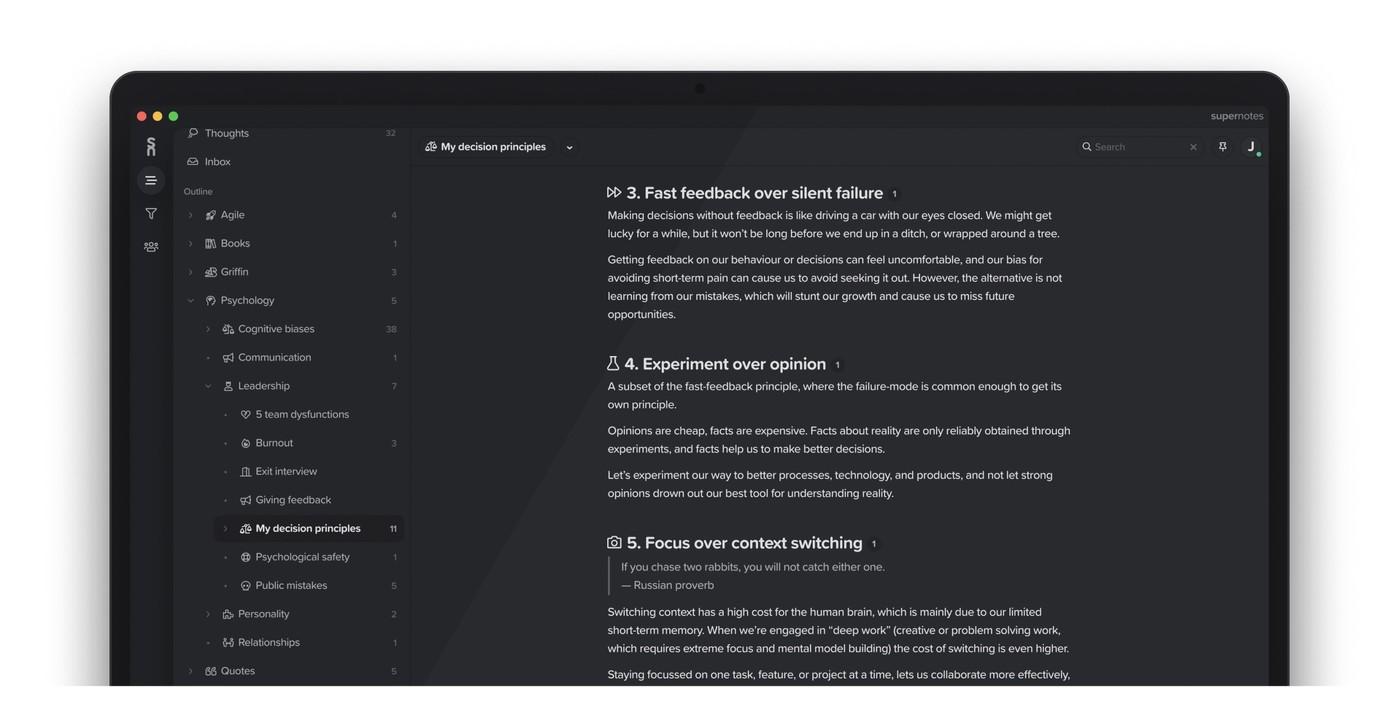
Taking notes consistently is a difficult task, so we are reaching out to our power users to hear their stories. Hopefully their knowledge and insight will help you with your own productivity workflow. This week we are hearing from James, one of our new Unlimited users.
Hi! My name is James, I’m 41 and live in Stockholm, Sweden with my wife, two daughters, and a cat. I’m VP of Engineering at Griffin Bank, which means that I coach our engineers, grow the teams, and lead our engineering process.
How were you taking notes before Supernotes?
I’ve been using DayOne as my work (and family) diary since 2012, and Notion as my Personal Knowledge Management tool since 2018.
Prior to discovering Notion, I had used (though not all at the same time) a number of other writing, note-taking, knowledge capture, and task tracking tools: Wunderlist, Ulysses, Letterspace, Bear, Dynalist, and Airtable.
Why did you start using Supernotes?
For Personal Knowledge Management
My favourite way to use Notion was to capture knowledge “cheatsheets” on topics such as agile (e.g. pre-mortems, retrospectives, roadmaps), behavioural science (e.g. cognitive biases), design (e.g. guidelines, user testing, workshops), leadership (e.g. coaching, conflict, decision making, feedback, motivation, needs), and recruitment (e.g. interviewer questions, job postings).
Capturing and curating my knowledge in Notion helped me: ① with learning and recollection, ② to be more effective in my role (prepping for a particular meeting was as easy as reviewing a “cheatsheet”), and ③ to share my knowledge with my colleagues (and sometimes the world).
Supernotes replaced Notion as my Personal Knowledge Management tool because: ① Supernotes is blazing fast (the < 100ms interface response times are incredible), ② the keyboard shortcuts allow me to create and navigate notes without a touchpad, ③ idea linking is bidirectional, fast, and at the right level of granularity for my brain, and ④ the Outline gives the benefits of Notion’s tree-view, but backed by the power of a bidirectional graph network.
For My Work diary
I’ve been keeping a daily work diary for the last nine years. I spend around 15 minutes at the end of each day reflecting on four main topics: progress, clarity, challenges, and what’s coming tomorrow. I try to capture any decisions we made, any outcomes, any insights or learnings I stumbled upon, and any challenges that I’m thinking about.
I make liberal use of tags, so it’s easier for me to search for specific topics, and to follow particular journeys of understanding.
I still use DayOne as my diary app, but now Supernotes augments my process. I used to take meeting notes directly in DayOne, but now I take them in Supernotes, and transfer them to DayOne at the end of the day. That’s because Supernotes’ bidirectional linking has revolutionised how quickly I can review meeting notes on a particular topic. For example, I can instantly get a single page overview of all my recent 1:1s with one colleague. In DayOne, it’s not possible to slice the information that way.
Why do notecards make such a difference?
Notecards capture knowledge at a level of granularity that fits perfectly with how my brain works. I’ve realised that, for me, pages are too “zoomed out” and bullet points are too “zoomed in”. Perhaps there’s a reason why the original Zettelkasten system used physical notecards, and why students all over the world use notecards to study for exams?
An embedded card James has kindly shared from his Supernotes
For me, notecards are the right level of abstraction because they: ① are an excellent size for our limited short-term memories to process and remember, ② encourage us to capture the essence of an idea, and to skip extraneous details, ③ encourage us to name an idea, ④ encourage us to link ideas together, and ⑤ encourage us to explore a network of related ideas.
With Notion I found that I spent too much time trying to make my pages look pretty (finding matching banners, colouring the text, picking the right kinds of blocks, etc.), rather than focussing on distilling the content down to its essence, or building a network of related ideas and concepts. With Supernotes I get amazing looking notecards out-of-the-box, which encourages me to focus my effort on capturing ideas, dividing ideas into their atomic components, and connecting related ideas together.
Because Supernotes notecards are more specific that Notion pages, I find it faster and more natural to link ideas together. For example, if a particular cognitive bias comes up in a discussion, then it’s lightning fast for me to link to its notecard – highlight the phrase, cmd + / , Enter:
Or if I make a particular decision, and I base it on one (or more) of my decision principles, then it’s easy for me to link to their notecard:
What’s your favourite Supernotes feature?
Speed. Supernotes lets me capture my thoughts, ideas, and notes at the “speed of thought”. The combination of instant UI feedback and the excellent keyboard shortcuts combine to make me feel like a knowledge wizard!

A screenshot James shared with us of his Supernotes
What other productivity apps do you use?
iA Writer for writing long-form prose, such as documents, posts, emails, etc. I find its total lack of chrome excellent for focus, and its style check helps to improve my writing.
Notion to collaborate remotely with all my colleagues and to manage our processes. Now I copy concepts out of Supernotes, and use them to form pages to share in Notion.
DayOne for capturing my work (and family) diary. Now I take meeting notes as bullet points in Supernotes, summarise the meeting in prose (still in Supernotes), and at the end of the day I filter for all meeting notecards with today’s date, and copy/paste the prose into my diary entry.
We hope you enjoyed reading James’s note-taking journey. If you’ve been using Supernotes regularly or have a productivity workflow you’d like to share, we’d love to hear from you. Get in touch with us over on Twitter, @supernotesapp or send us an email, [email protected]

Take notes effortlessly
Join thousands of happy notetakers!